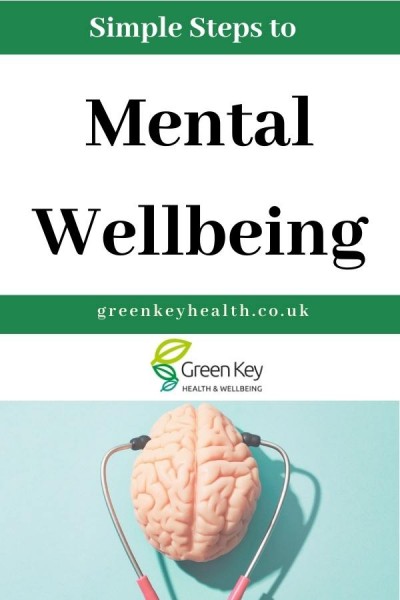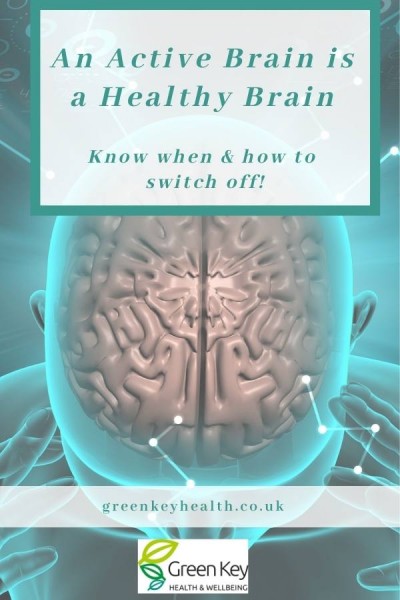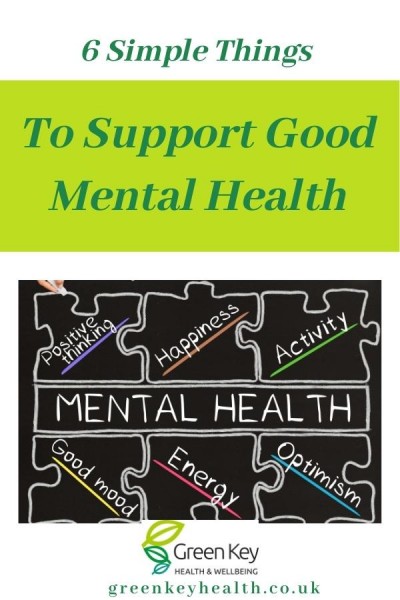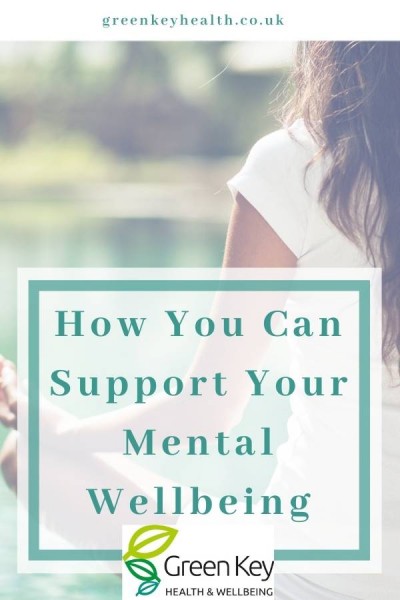
The topic of mental health has been in the media before the advent of Covid. Often looked at in binary terms of those who are healthy and those who have mental illness. The truth, however, is that mental wellness covers a huge spectrum. Even those who are "mentally healthy" can still improve their mental wellness. Without self-awareness and knowledge of how to maintain your mental health, poor mental health is something that can affect anyone of us.
Mental ill-health covers a huge spectrum from low mood through to anxiety and depression. Dementia and Parkinson’s are also classified under mental ill-health. Clearly no-one wants to suffer from Dementia related diseases or Parkinson’s. Therefore, as with all health issues whether mental or physical it is wise to address them from a proactive and preventative perspective, rather than being reactive when things start to get out of hand. At that point it often requires some kind of medical intervention in an attempt to provide quality of life.
Mental wellness is as much our responsibility as physical wellness. Infact the two are connected. Physical wellness achieved through a nutrient rich fresh diet, exercise, down-time and quality sleep, as well as keeping the body and mind hydrated are also pillars to good mental health. The binary approach of being healthy or having mental ill-health, is a reflection that we often consider mental health from a limited perspective only. Mental ill-health is not only the responsibility of the government, charitable foundations, your local doctor and your employer, but first and foremost it starts with you. We all need to be proactive and treat our mental and physical wellbeing with respect. In doing so, education, information and guidance from other parties does not fall on deaf ears.
6 Simple things you can do to support good mental health
Healthy gut – healthy brain
Research is plentiful on the microbiome-gut-brain axis. When our digestion is not working well we might suffer symptoms such as constipation, diarrhea, bloating, gas, indigestion or acid reflux. These are all indicators of an imbalance in the digestive system and that the health of your gut microbiome is suffering. As the gut has a direct connection to the brain via the gut-brain axis, it means that when the gut is not well, your brain will also suffer. Perhaps it will be less sharp, unable to remember information or simply foggy? Maintaining a healthy gut flora is essential for good mental health.
Several factors need to be considered to ensure a healthy microbiome in the gut including quality and variety of foods. In other words, your diet needs to feed healthy gut bacteria and starve bad bacteria. The saying “You are what you eat” speaks loud and clear. Eating the same thing every day will not populate the gut with healthy bacteria, nor will a diet rich in processed, starchy foods, and sugar. Key dietary strategies for good mental health include:
- Eat a low carbohydrate, low glycemic index diet of natural foods. Limit wheat and wheat-based products which lead to immediate feelings of satisfaction due to the sugar high you experience very soon after eating them. However 40 minutes later this high leads to a low that often results in an energy slump and brain fatigue.
- Eat the rainbow every day in an assortment of fruit, especially berries, and vegetables (30% fruit : 70% vegetables) in order to get a wide range of antioxidants, vitamins, minerals and dietary fibre.
- Reduce exposure to pesticides, preservatives and additives by eating whole foods and organic where possible. If you cannot afford organic foods, be sure to wash vegetables and fruit well before eating.
- Feed the brain on a daily basis by eating foods high in essential fatty acids (EFAs). Found in oily fish, olive oil, coconut oil, nuts and seeds, these are essential for good gut and brain health. Low fat foods seldom contain essential fatty acids and more often than not have added sugar.
- Spice up your life by including a wide range of herbs and spices in your diet. Both have many benefits depending on the specifics of the herb or spice. Perhaps most importantly they provide a plethora of flavours to tantalise the taste buds and stimulate digestive enzymes that aid digestion.
- Add fermented food and drinks to your diet. These are packed with good bacteria and easy to include with your everyday meals. Kefir can be a supplement for yoghurt. Kimchi makes a pleasant change as a slide dish or served with grilled meat or fish. Sauerkraut goes well on salad, in a sandwich or with cold fish or meat. Kombucha, a fermented tea comes in many flavours and can be enjoyed first thing in the morning to get the gut off to a good start or in the evening before going to bed so that it works whilst you are sleeping. Sugar is always found in Kombucha because this is what starts the fermentation process. However, avoid those varieties that are overloaded with sugar.
Treat your mind and body with respect
In our fast-paced world we often overlook the importance of taking care of both mind and body. In fact, we often take our health for granted, working long hours, pre-Covid in an air-conditioned environment, or converted cupboard which is the only place you can find some peace when working from home, eating a quick snack, rather focusing on the kids who need feeding whilst on break between lessons, often missing that walk outside to get some fresh air and movement that had you been in the office, would have meant that at least you would pop out quickly to the local café or supermarket to buy some lunch.
Treat your mind and body like a temple. Take care of yourself with the highest intentions to maintain a healthy mind and body. Put aside “me” time to practice activities that bring inner peace and joy, such as yoga, meditation, singing and dancing. Through joy and inner peace we raise our self-awareness of how we are feeling so that when listening to your body you can correct your lifestyle and eating habits before symptoms of ill-health start to show on the physical and/or mental levels when the damage already done.
Keep your brain active – Know when to switch off
The brain, as for the body requires exercise. Activities that challenge your comfort zone and mental constructs are all necessary to keep the brain active, but these activities need to be varied and kept within “safe” limits. In other words, when you start to agonize over something allowing it to encroach or absorb your personal life leading to erratic behaviour, poor quality sleep and worry, it has gone out of safe limits, and you are well on the road to mental ill-health and burnout. The importance of knowing when and how to switch off is vital for mental wellbeing and a relaxed demeanor that creates flow, enabling logical and calm thinking, whilst avoiding mental overload.
To train your brain and to keep it agile and active, mental stimulation is vital. Learning new things is a great way to keep your brain in good health, for example taking language lessons, attending presentations and talks that stimulate your brain, and pursuing activities such as Sudoko, crosswords, playing Chess, Bridge and Scrabble.
Stride out into nature to fill yourself up with fresh air and natural light
Research around the positive impact of nature on our psychological and physical health, is on the increase. Not all of us have the benefit of a garden, but most live in an area that is close to a park, forest, river, lake or beach where we can enjoy the calming influence of mother nature. In a 2019 study of 20,000 people, led by Dr Matthew White (European Centre for Environment & Human Health at the University of Exeter), found that people who spent two hours a week in green spaces have better health and wellbeing. A daily dose of nature helps to regulate inner rhythm to be more in tune with your surroundings. It helps with increasing your ability to be present rather than tied up and worried about what should be, what has still to be and what might be. What is now, is what matters. Mother nature also gives that feel good factor that is so important to stable mental health.
Be mindful – Live in the moment
How you are affects how you are in and with the world. Mindfulness means living in the present, not being concerned about the future or the past, but being fully present to what you are doing now, whether that is typing, doing the ironing or running. Being mindful enables greater clarity around life and it stops you from being judgmental about yourself or others. As the famous Jimmy Cliff song says:
“I can see clearly now the rain is gone.
I can see all obstacles in my way.
Gone are the dark clouds that had me blind.
It's gonna be a bright, bright sunshiny day”
A recent study conducted by Oxford Mindfulness Research Centre headed “Parental mental health worse since new lockdown restrictions” states “Participating parents and carers recently reported an increase in symptoms of stress, anxiety, and depression, especially during the period from November to December. This reflected symptoms such as difficulty relaxing, being easily upset or agitated, feeling hopeless, and lacking interest and pleasure, feeling fearful and worried, as well as being more irritable, over-reactive and impatient. This mirrors parent and carer reports of high levels of stress and depression between April and July last year, which were followed by lower levels of these difficulties between July and September.”
Mindfulness allows you to intentionally see and feel your own emotions, emotions of those around you and respond in a calm manner to what might be going on in yourself or others. Living in the present creates a conscious choice of how you respond, as opposed to the “tail wagging the dog”, the “dog wags the tail” providing feelings of confidence, comfort and security. In these times of uncertainty, mindful practice is a simple practice that you can tune into at any time, even when doing the most mundane of activities, providing you with positive thoughts and feelings about yourself, the situation you are in and the future.
Forget the excuses – try something new and do it anyway!
It is so easy to get into our comfort zone of routine, that often leads to lack of mental stimulation through isolation from others. It has taken Covid to highlight the importance of social contact to keep us mentally stable and active, and our brains challenged through conversation. It has taken Covid to shake our individual comfort zones and make us challenge the need to travel to go to work in an office? The need to shop for things that soon loose popularity and end up serving no real purpose? It has taken Covid to make each one of us reflect on how we live our lives and what is truly important.
Whilst we can turn to social services, the government and the National Health Services for support and assistance, it is you who play an enormous role in securing your own stable and healthy mental wellbeing that is not only able to meet the challenges of today and the future, but thrive on them.
To discuss something prior to booking your kinesiology, naturopathic and herbal consultation, please contact Rachel directly.
New here? I write about how to take a holistic approach to health and well-being, to treat illness and help you be the best you can be. You can read similar blogs here:
Rise & Shine to Inspire your Children during Lockdown
Everything You Need to Know about Intermittent Fasting
Traditional Ayurvedic Home Remedy for Colds and Flu
Benefits of Vitamin D in Immunity and Protecting against Depression
Fermented Foods – A Simple Way to Good Gut Health
The Fear Factor – What’s Holding You Back?
Post COVID19: 5 Steps to Creating Strong Immune Health in the Workplace
10 Tips for Protection Against Electromagnetic Radiation
Do you love Pinterest as much as I do? Please pin any of these graphics!





Add new comment